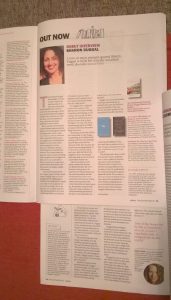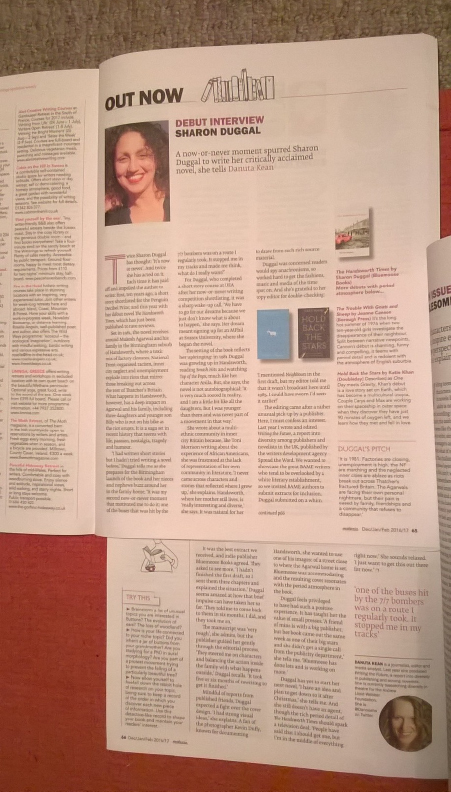 From Mslexia Magazine Issue 72.
From Mslexia Magazine Issue 72.
Twice Sharon Duggal has thought: ‘It’s now or never’. And twice she has acted on it. Each time it has paid off and impelled the author to write: first, ten years ago, a short story shortlisted for the Penguin Decibel Prize; and this year with her début novel The Handsworth Times, which has just been published to rave reviews.Set in 1981, the novel revolves around Mukesh Agarwal and his family in the Birmingham suburb of Handsworth, where a toxic mix of factory closures, National Front-organised racism, inner city neglect and unemployment explode into riots that mirror those breaking out acrossthe rest of Thatcher’s Britain. What happens in Handsworth, however, has a deep impact on Agarwal and his family, including three daughters and younger son Billy who is out on his bike asthe riot erupts. It is a saga set in recent history that teems with life, passion, nostalgia, tragedy and humour.‘I had written short stories but I hadn’t tried writing a novel before,’ Duggal tells me as she prepares for the Birmingham launch of the book and her nieces and nephews buzz around herin the family home. ‘It was my second now-or-never moment that motivated me to do it: oneof the buses that was hit by theDEBUT INTERVIEWSHARON DUGGALA now-or-never moment spurred Sharon Duggal to write her critically acclaimed novel, she tells Danuta Kean7/7 bombers was on a route I regularly took. It stopped me in my tracks and made me think, what do I really want?’For Duggal, who completed a short story course at UEA after her now-or-never writing competition shortlisting, it was a sharp wake-up call. ‘We have to go for our dreams because we just don’t know what is about to happen,’ she says. Her dream meant signing up for an MPhil at Sussex University, where she began the novel.The setting of the book reflects her upbringing: in 1981 Duggal was growing up in Handsworth, reading Smash Hits and watching Top of the Pops, much like her character Anila. But, she says, the novel is not autobiographical: ‘It is very much rooted in reality, and I am a little bit like all the daughters. But I was younger than them and was never part of a movement in that way.’She wrote about a multi- ethnic community in innercity Britain because, like Toni Morrison writing about the experience of African Americans, she was frustrated at the lackof representation of her own community in literature. ‘I never came across characters and stories that reflected where I grew up,’ she explains. Handsworth, where her mother still lives, is ‘really interesting and diverse,’ she says. It was natural for herto draw from such rich source material.Duggal was concerned readers would spy anachronisms, so worked hard to get the fashions, music and media of the time spot on. And she’s grateful to her copy editor for double-checking:‘I mentioned Neighbours in the first draft, but my editor told me that it wasn’t broadcast here until 1985. I could have sworn I’d seen it earlier!’The editing came after a rather unusual pick-up by a publisher. Here, I must confess an interest. Last year I wrote and edited Writing the Future, a report into diversity among publishers and novelists in the UK, published by the writers development agency Spread the Word. We wanted to showcase the great BAME writers who tend to be overlooked by a white literary establishment,so we invited BAME authors to submit extracts for inclusion. Duggal submitted on a whim.continued p66The Handsworth Times by Sharon Duggal (Bluemoose Books)More débuts with period atmosphere below…The Trouble With Goats and Sheep by Joanne Cannon (Borough Press) It’s the longhot summer of 1976 when two ten-year-old girls investigate the disappearance of their neighbour. Split between narrative viewpoints, Cannon’s début is charming, funny and compelling, it teems with period detail and is redolent with the atmosphere of English suburbia.Hold Back the Stars by Katie Khan (Doubleday) Described as OneDay meets Gravity, Khan’s débutis a love story set on Earth, which has become a multicultural utopia. Couple Carys and Max are working on their spaceship in outer space when they discover they have just 90 minutes of oxygen left, and we learn how they met and fell in love.DUGGAL’S PITCH‘It is 1981. Factories are closing, unemployment is high, the NF are marching and the neglected inner cities are ablaze as riots break out across Thatcher’s fractured Britain. The Agarwals are facing their own personal nightmare, but their pain is eased by family, friendships and a community that refuses to disappear.

